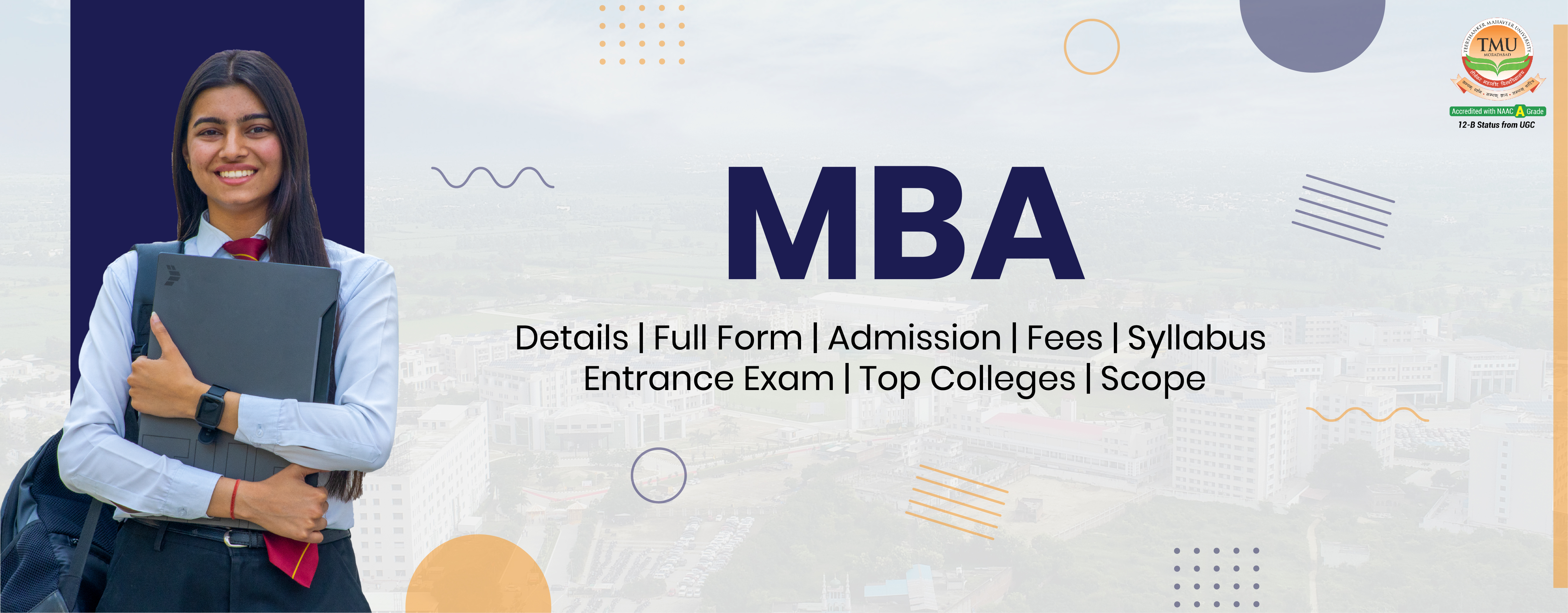MBA Courses: Details, Full Form, Admission, Fees, Syllabus, Entrance Exam, Top Colleges, Scope
Table of Contents
An MBA (Master of Business Administration) is a professionally oriented postgraduate degree designed to develop advanced managerial, leadership, and strategic decision-making capabilities. The programme integrates core management fundamentals with industry-oriented specialisations, enabling graduates to handle complex business challenges across sectors such as finance, consulting, technology, healthcare, manufacturing, and entrepreneurship.
Unlike conventional postgraduate degrees, an MBA emphasises case-based learning, real-world projects, internships, and leadership development, making it suitable for both fresh graduates and working professionals aiming for accelerated career growth.
Full Form of MBA Course
MBA stands for Master of Business Administration, a postgraduate professional degree focused on management, leadership, and business strategy.
Teerthanker Mahaveer University
Apply for Admission
Click Here To Apply for Admission
Overview of an MBA Course
| Aspect | Details |
| Full Form | Master of Business Administration |
| Course Level | Postgraduate (Professional Degree) |
| Duration | 2 years (full-time) / 1–2 years (executive or accelerated) |
| Eligibility | Bachelor’s degree with minimum 50% marks (45% for reserved categories) |
| Admission Process | Entrance exam (CAT, XAT, CMAT, NMAT, SNAP, etc.) + GD/PI/WAT rounds |
| Course Type | Full-time, Part-time, Executive, Online, Distance |
| Core Subjects | Marketing, Finance, Human Resources, Operations, Business Analytics, Strategy |
| Specializations Offered | Finance, Marketing, HR, Operations, IT, International Business, Entrepreneurship, etc. |
| Skills Developed | Leadership, Strategic Thinking, Communication, Decision-Making, Problem-Solving |
| Average Course Fee | ₹4 lakh – ₹25 lakh (varies by institute) |
| Average Starting Salary | ₹8 lakh – ₹25 lakh per year (depending on institute and specialization) |
| Top Recruiters | Consulting Firms, Banks, FMCG Companies, IT Firms, Startups, E-commerce Companies |
| Career Opportunities | Business Manager, Financial Analyst, Marketing Manager, HR Manager, Product Manager, Consultant |
Which Type of MBA Is Right for You?
| MBA Type | Ideal For |
|---|---|
| Full-Time MBA | Fresh graduates and early professionals seeking campus placements |
| Executive MBA | Mid to senior professionals with 5+ years of work experience |
| Global MBA | Candidates targeting international roles or multinational exposure |
| Integrated MBA | Students certain about pursuing management careers immediately after Class 12 |
| Online / Distance MBA | Working professionals seeking flexibility without a career break |
MBA Course Syllabus
| Semester | Core Subjects | Elective / Specialization Subjects | Skill / Practical Courses |
| Semester 1 |
| -- |
|
| Semester 2 |
| -- | - Business Environment Analysis - Summer Internship / Project |
| Semester 3 |
| Choose specialization:
|
|
| Semester 4 |
| Specialization continuation:
|
|
MBA Salary in India (By Experience)
| Level | Average Salary |
|---|---|
| Freshers (0–2 yrs) | ₹5 – ₹10 LPA |
| Mid-Level (3–5 yrs) | ₹12 – ₹20 LPA |
| Senior Roles (8+ yrs) | ₹25 – ₹50+ LPA |
What Skills Does an MBA Curriculum Develop?
- Strategic Thinking: Developed through strategy, economics, and leadership-focused modules.
- Financial Acumen: Built via accounting, financial management, corporate finance, and valuation subjects.
- Leadership & Communication: Strengthened through presentations, group discussions, case analyses, and team-based assignments.
- Problem-Solving: Enhanced using real-world business cases, simulations, and decision-making frameworks.
- Industry Readiness: Achieved through internships, live industry projects, and capstone projects that bridge theory and practice.
MBA Eligibility Criteria (India)
- Bachelor’s degree in any discipline from a recognised university.
- Minimum 50% aggregate marks (45% for reserved categories, as per norms).
- Valid score in recognised MBA entrance exams (e.g., CAT, MAT, XAT, GMAT).
- Work experience preferred; mandatory only for Executive MBA programmes.
- No upper age limit for most institutions.
Entrance Exam
- CAT: CAT is a common admission test, conducted by the Indian Institutes of Management. This exam is conducted once a year and is a computer-based test. It is India’s most competitive exam for admission to an MBA. The total duration of this exam is two hours.
- XAT: XAT stands for Xavier Aptitude Test, conducted by the XLRI Jamshedpur. It is a computer-based test. This entrance exam is conducted for admission to MBA/PGDM courses. The score is accepted by over 160 other business schools in India.
- CMAT: CMAT stands for Common Management Admission Test. The examination is conducted by NTA ( National Testing Agency ). This is also a computer-based test. The duration of this course is three hours.
- NMAT: NMAT is an NMIMS Management Aptitude Test, conducted by Graduate Management Admission Council. This exam is conducted once a year and is a computer-based test. The duration of this entrance exam is 120 minutes (2 hours).
- Other: There are many other entrance exams conducted for admission to MBA, such as SNAP, IIFT, MICAT, TISSNET AND ATMA (AIMS Test for Management Admissions).
MBA Admission Process (Step-by-Step)
- Meet eligibility criteria.
- Appear for relevant entrance exam.
- Apply to shortlisted institutes.
- Attend GD/WAT/PI rounds (Group Discussion / Written Ability Test / Personal Interview).
- Final selection based on composite score.
- Pay the fees and complete enrolment.
MBA Course Fees in India (Realistic)
| Institute Type | Total Fee Range |
|---|---|
| IIMs / Top Tier | ₹20 – ₹30 lakh |
| Government Universities | ₹1 – ₹5 lakh |
| Private Universities | ₹4 – ₹15 lakh |
Top Colleges for MBA Course
| College / University Name | Location | Key Highlights |
| Indian Institute of Management Ahmedabad (IIMA) | Ahmedabad, Gujarat | Case-based learning and a strong alumni network. |
| Indian Institute of Management Bangalore (IIMB) | Bengaluru, Karnataka | Focuses on leadership, entrepreneurship, and global exposure. |
| Symbiosis Institute of Business Management (SIBM) | Pune, Maharashtra | Excellent corporate interface and modern pedagogy. |
| Teerthanker Mahaveer University (TMU) | Moradabad, Uttar Pradesh | NAAC ‘A’ accredited university with 85% placement rate, modern infrastructure, and national & international collaborations. |
| University of Delhi (FMS) | New Delhi | Offers high ROI with low fees and top placements. |
Why Choose TMU for an MBA Course?
Teerthankar Mahaveer University offers UGC approved and NAAC-A-accredited courses. TMU provides an international exposure-oriented curriculum, the presence of senior faculty and quality placement services, securing the future career development. The program has offerings such as practical experience, case-based learning, global qualifications, industry interactions, a student-focused approach and affordable fees.
Career Opportunities after MBA
An MBA course offers a wide range of career opportunities for students. Whether you want to do a job or start a business, an MBA opens numerous opportunities in both. Here’s a short breakdown of some common career opportunities after an MBA:
| MBA Specialisation | Career Opportunities / Job Roles | Average Salary Range |
| General Management | Business Consultant, Project Manager, Strategy Manager | ₹75 lakh – ₹1.3 crore |
| Finance | Investment Banker, Financial Analyst, Portfolio Manager, Risk Manager, Corporate Finance Manager | ₹75 lakh – ₹1.6 crore |
| Marketing | Brand Manager, Product Manager, Digital Marketing Manager, Market Research Analyst, Sales Director | ₹66 lakh – ₹1.25 crore |
| Human Resource Management (HRM) | HR Manager, Talent Acquisition Lead, L&D Manager, HR Business Partner | ₹58 lakh – ₹1 crore |
| Operations Management | Operations Manager, Supply Chain Manager, Procurement Manager, Logistics Analyst | ₹62 lakh – ₹1.1 crore |
| Information Technology (IT) / Systems | IT Manager, Business Analyst, Product Manager, IT Consultant | ₹70 lakh – ₹1.25 crore |
| International Business | Export Manager, Global Business Development Manager, Trade Analyst, International Marketing Manager | ₹66 lakh – ₹1.15 crore |
| Entrepreneurship | Startup Founder, Business Consultant, Venture Capital Associate | Variable (High risk/reward) |
| Business Analytics | Data Analyst, Business Intelligence Manager, Analytics Consultant | ₹70 lakh – ₹1.25 crore |
| Healthcare Management | Hospital Administrator, Healthcare Consultant, Medical Practice Manager | ₹66 lakh – ₹1.15 crore |
| Sustainability / CSR / ESG | Sustainability Manager, CSR Head, ESG Consultant | ₹58 lakh – ₹1.1 crore |
| Public Policy / Nonprofit | Policy Analyst, Program Manager, Development Director | ₹50 lakh – ₹90 lakh |
MBA vs Other Degrees
| Parameter | MBA | PGDM | M.Com |
|---|---|---|---|
| Orientation | Professional | Industry-focused | Academic |
| Career Focus | Leadership | Skill-based | Finance/Research |
| Global Value | High | High | Moderate |
Conclusion
An MBA is a perfect opportunity for those who want to build their career in the marketing and HR fields. It provides diverse career opportunities in numerous sectors. It provides global exposure to students to work across industries and countries. By taking this course, the students are able to acquire numerous skills such as communication skills, decision-making skills and leadership skills. It is an important investment in your career process and personal growth.
FAQ
Q1. Which is the best MBA course?
Ans. There’s not a single best MBA course. The best specialisation is always based on your personal interests, strengths, and career ambitions.
Q2. Is an MBA course only 2 years?
Ans. Most MBA programs require approximately two years; options are available to individuals who want to have alternative schedules.
Q3. Who is eligible for an MBA course?
Ans. To be eligible for the MBA course, you are required to have a bachelor degree of at least a percentage such as 50 per cent.
Q4. Is an MBA good after 12th?
Ans. Yes, an Integrated MBA course is a good solution for students who are certain about their career goal of moving into management or leadership roles. The duration of this program is 5 years, divided into 10 semesters.
This content gives an overview of the programme and is for educational purposes only. For updated admission guidelines and counselling support, please connect with our Counsellor Team.














